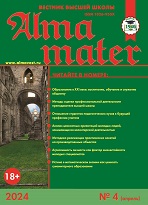UDC 37+004
https://doi.org/10.20339/AM.06-22.010
Marina V. Kostolomova, PhD in Sociology, Leading researcher at Institute of Sociology of the Federal Center of Theoretical and Applied Sociology of the Russian Academy of Sciences (IS FCTAS RAS), e-mail: m.kostolomova@yandex.ru
Modern Russian society is experiencing a state of “zeroing out” of old, obsolete social, political, economic, socio-cultural constructs. This state of society is caused by parallel internal and external processes transforming it. The discourse of such a state of society formulates a request to preserve and strengthen the national security of the state as a whole. In the light of recent foreign policy events and changes in dispositions on the world stage, as well as the shift in the policy of Western states towards the promotion of widespread “de-russification”, one of the key elements of such security is information security. In the conditions of social reality, its cognitive and socio-psychological aspects acquire a qualitatively new status demanded by society. In this regard, the author formulates the need for a scientific and methodological approach to the problem of finding solutions in order to preserve, strengthen and increase information security in the context of not only physical, but also mental, as well as psycho-emotional preservation in the conditions of modern social reality. The paper actualizes the requirement to ensure information security through one of the system-forming social institutions. Education, which is functionally capable of performing both the role of a “mirror” of society and an instrument of its transformation, should play a priority role in strengthening Russia’s information security. In order to develop ways to preserve information security, it is proposed to categorize the main components of education as a process according to the principle of content and practical aspects. Further, the article presents relevant practice-oriented recommendations.
Key words: national security, information security, information impact, social reality, education.
References
1. Doctrine of Information Security of the Russian Federation. URL: http://www.scrf.gov.ru/security/information/document5/ (accessed on: 18.04.2022).
2. Concept of information security of children. URL: http://publication.pravo.gov.ru/Document/View/0001201512070019?index=0&r... (accessed on: 21.04.2022).
3. Karepova, S.G., Kostolomova, M.V. “Post-quarantine” social reality: contours and contradictions. Alma mater (Vestnik vysshei shkoly). 2021. No. 12. P. 23–29. DOI: 10.20339/AM.12-21.023
4. Signing of voluntary commitments by the founding companies of the Alliance to protect children in the digital environment. President of Russia. URL: http://kremlin.ru/events/president/transcripts/66557 (accessed on: 21.04.2022).
5. Decree of the Government of the Russian Federation of December 18, 2020 No. 2150 “On establishing a quota for education of foreign citizens and persons without citizenship in the Russian Federation”. URL: https://base.garant.ru/75091924/? (accessed on: 18.04.2022).
6. Order of the Ministry of Education of the Russian Federation of December 11, 2020, No. 712 “On Amendments to Some Federal State Educational Standards of General Education on Matters of Educating Students”. URL: https://www.garant.ru/products/ipo/prime/doc/400042312/? (accessed on: 18.04.2022).
7. Strategy of National Security of the Russian Federation. URL: http://kremlin.ru/acts/bank/47046 (accessed on: 20.04.2022).
8. Federal State Autonomous Institution “Federal Institute for Digital Transformation in Education”. Main information. URL: https://ficto.ru/content/osnovnye-svedeniia (accessed on: 20.04.2022).
9. Federal Law of December 29, 2012 No. 273-FZ “On Education in the Russian Federation”. URL: http://ivo.garant.ru/#/document/70291362/paragraph/9:0 (accessed on: 17.04.2022).











.png)






